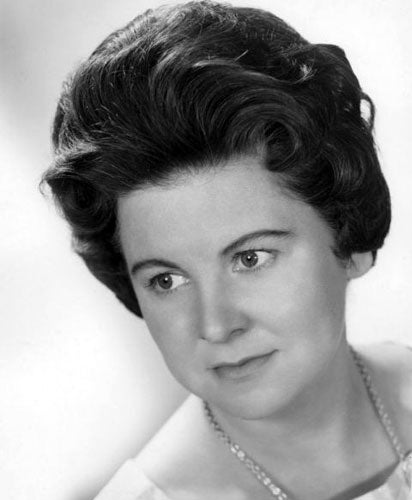Marjorie Thomas: Contralto who sang under Sargent, Barbirolli and Beecham

Your support helps us to tell the story
From reproductive rights to climate change to Big Tech, The Independent is on the ground when the story is developing. Whether it's investigating the financials of Elon Musk's pro-Trump PAC or producing our latest documentary, 'The A Word', which shines a light on the American women fighting for reproductive rights, we know how important it is to parse out the facts from the messaging.
At such a critical moment in US history, we need reporters on the ground. Your donation allows us to keep sending journalists to speak to both sides of the story.
The Independent is trusted by Americans across the entire political spectrum. And unlike many other quality news outlets, we choose not to lock Americans out of our reporting and analysis with paywalls. We believe quality journalism should be available to everyone, paid for by those who can afford it.
Your support makes all the difference.The name of Marjorie Thomas is inextricably linked musically with that of the conductor Sir Malcolm Sargent, who is said to have regarded her as his favourite contralto. The number of occasions they appeared together – including the Proms – seems to bear witness to this. She certainly had high opinions of him: "His interpretations always had such elasticity', she told Sargent's biographer Richard Aldous in 1999. "He was always prepared to give soloists a great deal of freedom in interpretation and one never felt rushed or dragged back; with Sargent everything was so fluid."
As well as for live performances, Sargent chose Thomas for recordings of a wide range of music, from his Glyndebourne series of Gilbert and Sullivan to a treasurable Dream of Gerontius with Richard Lewis and John Cameron as fellow soloists.
Marjorie Thomas grew up in Oldham, Lancashire, having moved there at the age of two with her parents from Sunderland, where she was born in 1923. Her father was a Welsh marine engineer and amateur tenor and her mother, a Scottish pianist. After initial piano lessons with her mother, Marjorie continued her studies with William Walton's brother Noel, and it was to study the piano that she won a scholarship to the then Royal Manchester College of Music at the age of 17.
However, an interest in singing led her to the celebrated Elsie Thurston, with whom she studied after her first term at the college. Among her fellow singing students at the time was the tenor Richard Lewis, with whom she was subsequently to appear many times, including that Gerontius recording of 1954.
She was heard in 1945 by John Barbirolli, who gave her work, and with whom in 1948 she recorded arias from Elijah and from Handel's Alcina with the London Symphony Orchestra. Also in 1945 she was engaged by Sir Thomas Beecham for a broadcast performance of Borodin's Prince Igor and subsequently married Edwin (Teddy) Gower, the sound engineer on that broadcast. Their only child, Eileen – a singer and now a private teacher of music – was born in 1948.
She also received further work from Beecham, for his London Delius Festival. A group of solo songs sung at the penultimate concert in the Central Hall, Westminster, "brought a rare pleasure in the singing of Miss Marjorie Thomas, whose rich voice has lost none of its natural beauty in the acquisition of the art of using it beautifully", said a newspaper critic. Sixteen years later, this time at the Delius Festival in Bradford, she and the tenor Gerald English, together with Gerald Moore, "produced the mellifluous flow of tone that is always a first essential with this composer".
Although she springs to mind first as a concert singer, Marjorie Thomas had considerable success in opera, as can be heard on the recently issued CDs of Wagner's Ring cycle conducted by Rudolf Kempe at Covent Garden in 1953, when she sang the roles of Flosshilde and Rossweise. In the same year she was also the nymph Dryad at Glyndebourne in Ariadne auf Naxos.
In the English Opera Group's The Beggar's Opera at Sadler's Wells in 1954, however, she was commended for her singing but "was not the ingenuous Polly but a nice governessy sort of girl". She also sang Hermia in the premiere of Britten's A Midsummer Night's Dream at Covent Garden in 1960. In 1953 she had taken part with other notable English singers of the time in the Gilliat and Launder film The Story of Gilbert and Sullivan, with Robert Morley and Maurice Evans in the title roles.
In the early 1960s she had begun to teach at the Royal Manchester College of Music but in 1963 Sir Thomas Armstrong asked her to join his staff at the Royal Academy of Music in London, where she became the first Head of Vocal Studies and remained until she retired in 1990.
Marjorie Thomas was a very good teacher, and I remember an inspiring masterclass she gave in the 1980s for the Association of English Singers and Speakers. What impressed me, as well as her warmth and friendliness, was her confidence in the singers' ability to discover things naturally for themselves (perhaps with suitable guidance) rather than have a solution imposed upon them by a teacher. She was a lovely person and a fine artist.
Garry Humphreys
Marjorie Thomas, contralto singer and teacher: born Sunderland 5 June 1923; Professor, Royal Academy of Music 1963-90, Head of Vocal Studies 1983-89; married 1947 Edwin Gower (one daughter); died London 12 September 2008.
Join our commenting forum
Join thought-provoking conversations, follow other Independent readers and see their replies
Comments